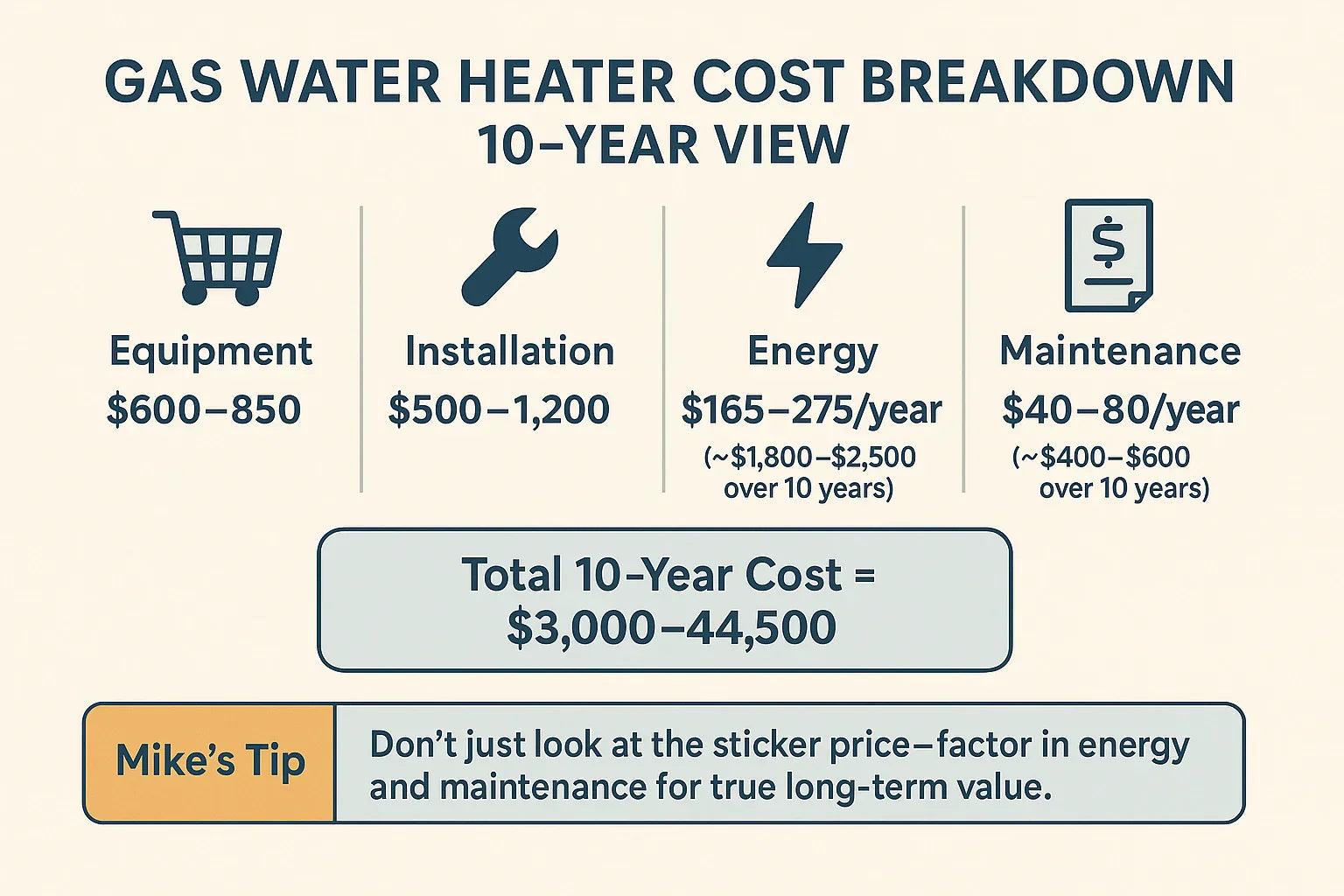Buying a water heater isn’t something most homeowners plan for—it’s usually an emergency. You notice lukewarm showers, or worse, you step into the basement and find a puddle under your tank. Suddenly, you’re faced with a big decision: what’s this going to cost me?
Here’s the truth: the real cost of a gas water heater is more than just the sticker price on the tank. From my own experience installing a State ProLine 40-Gallon Tall Gas Water Heater, I quickly learned that you need to factor in:
-
🛒 Equipment costs (the heater itself)
-
🔧 Installation costs (labor, venting, and extras)
-
⚡ Energy costs (monthly gas bills)
-
🧾 Long-term value (maintenance, lifespan, and potential rebates)
In this guide, I’ll break down each category, give you realistic numbers, and share lessons from my own installs and neighbors’ experiences.
🛒 Equipment Costs: Choosing the Right Gas Water Heater
When shopping for a 40-gallon gas water heater, you’ll notice a wide price range. Here’s what drives those numbers:
1. Standard Gas Tank Heaters
-
Price: $600–$850
-
Example: State ProLine Tall 40-Gallon, AO Smith Signature, Rheem Performance.
-
Best for: Families of 2–4, tight budgets, straightforward installs.
👉 These are the workhorses. No fancy electronics, just steady hot water.
2. High-Efficiency / ENERGY STAR Gas Tank Heaters
-
Price: $900–$1,200
-
Better insulation, improved burner design, and higher efficiency ratings.
-
Qualify for rebates and tax credits in 2025.
👉 They cost more upfront, but incentives and lower bills help offset that.
3. Tankless Gas Water Heaters
-
Price: $1,200–$2,000+
-
Heat water on demand = no standby losses.
-
Require more complex installation (venting + plumbing).
👉 Great for endless hot water, but higher upfront investment.
🔗 Home Depot – Types of Water Heaters
🔧 Installation Costs: More Than Just Setting the Tank Down
When I first budgeted for my replacement, I thought, “Okay, $700 for the tank, maybe $200 for installation.” Wrong. Installation can cost as much—or more—than the heater itself.
💵 Typical Installation Costs (2025):
-
Basic swap (same size, existing venting): $500–$800
-
With venting updates or code upgrades: $800–$1,200
-
Tankless installation: $1,000–$1,500+
👉 My install needed a new vent pipe—an extra $250 I hadn’t planned for.
🛠️ Factors That Add to Installation Cost
-
Venting adjustments: If your flue pipe is corroded or doesn’t slope properly.
-
Gas line updates: If the old connector doesn’t meet code.
-
Permits: $50–$200 depending on city requirements.
-
Drain pan or expansion tank: $50–$150 each.
🔗 Forbes – Water Heater Installation Costs
⚡ Energy Use & Monthly Gas Bills
The biggest hidden cost of any water heater isn’t the purchase price—it’s the energy it uses over its life.
📊 Average Gas Water Heater Energy Use
-
40-gallon tank: 150–250 therms/year
-
Average natural gas price (2025): ~$1.10 per therm
-
Annual cost: $165–$275
👉 That means over 10 years, you’ll pay $1,600–$2,700 in gas bills just for hot water.
🔥 How Efficiency Affects Costs
-
Standard gas tanks: Energy Factor (EF) ~0.62–0.65.
-
ENERGY STAR models: EF ~0.67–0.70+.
-
Tankless gas heaters: EF ~0.87+.
Savings:
-
High-efficiency tanks can save $30–$50/year.
-
Tankless units can save $75–$100/year—but cost much more upfront.
🔗 Energy.gov – Water Heating Basics
🧾 Long-Term Value: The Real Investment
This is where most homeowners don’t do the math. Let’s look at the total cost of ownership over 10–12 years.
🛠️ Maintenance Costs
-
Annual flush: Free if DIY, ~$100 if pro.
-
Anode rod replacement every 4–6 years: $30–$50.
-
Occasional service calls: $100–$200.
👉 Expect $40–$80/year in maintenance if you keep up with it.
🏷️ Rebates & Tax Credits (2025)
Thanks to the Inflation Reduction Act:
-
ENERGY STAR gas storage heaters → Up to $600 tax credit.
-
Utility rebates → $50–$400, depending on state and model.
👉 My neighbor upgraded to an ENERGY STAR gas tank, paid $200 more upfront, but got $750 back in credits and rebates.
🔗 ENERGY STAR – Water Heater Tax Credits
🔗 DSIRE – State Incentives Database
⏳ Lifespan & Replacement Cycles
-
Standard gas tanks: 8–12 years.
-
High-efficiency gas tanks: 10–15 years.
-
Tankless: 15–20 years with maintenance.
👉 A standard tank may need replacing twice in 20 years, while a tankless could last the whole time.
📊 10-Year Cost Comparison: Standard vs. ENERGY STAR vs. Tankless
| Category | Standard 40-Gal Tank | ENERGY STAR Tank | Tankless Gas |
|---|---|---|---|
| Equipment + Install | $1,200–$1,600 | $1,400–$1,900 | $2,500–$3,500 |
| Energy (10 yrs) | $1,800–$2,500 | $1,500–$2,200 | $1,200–$1,600 |
| Maintenance | $400–$600 | $400–$600 | $600–$1,000 |
| Rebates/Tax Credits | None | $150–$750 | $400–$900 |
| 10-Yr Total | $3,400–$4,700 | $3,000–$4,500 | $4,300–$6,000 |
👉 Mike’s Verdict: For most families, an ENERGY STAR 40-gallon gas tank gives the best balance of cost, rebates, and reliability. Tankless is great if you want endless hot water and plan to stay in your home for 15+ years.
✅ Mike’s Final Take
When I bought my last water heater, I thought the cost ended with the tank itself. I learned quickly that the true cost of ownership comes down to:
-
🛒 Equipment: $600–$850 for standard, $900+ for efficient.
-
🔧 Installation: $500–$1,200 depending on complexity.
-
⚡ Energy bills: $165–$275 every year.
-
🧾 Maintenance + rebates: $40–$80/year maintenance, but rebates can save you hundreds.
Over 10 years, you’ll spend $3,000–$4,500 on a typical gas water heater when you add everything up.
👉 My advice? Don’t just look at the upfront sticker price. Think long-term. For my money, the State ProLine 40-Gallon Gas Heater gave me the right mix of affordability, reliability, and predictable costs.
In the next topic we will know more about: Longevity Guide: How Long Will a 40-Gallon State ProLine Water Heater Last?







